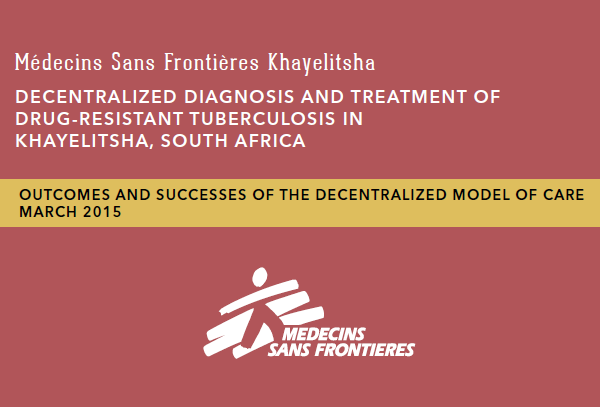
The decentralised model is aimed at diagnosing and treating the majority of DR-TB patients in primary health clinics, instead of being required to be hospitalised for up to six months.
Since 2007, in response to the growing epidemic of drug-resistant tuberculosis (DR-TB) in Khayelitsha, Médecins Sans Frontières (MSF), City of Cape Town and the Western Cape Departments of Health have been piloting a decentralised model of care for DR-TB patients. Khayelitsha is a township with one of the highest burdens of HIV infection and tuberculosis across South Africa and globally.
This decentralised model is aimed at diagnosing and treating the majority of DR-TB patients in primary health clinics, instead of being required to be hospitalised for up to six months – which takes up valuable bed space and is psychologically damaging for patients and families.
This project has been described in two previous reports:
2009: Khayelitsha Annual Activity Report 2008-2009
2011: Scaling up diagnosis and treatment of drug-resistant tuberculosis in Khayelitsha, South Africa
The latest 2015 report ‘Decentralised Diagnosis and Treatment of Drug-Resistant Tuberculosis in Khayelitsha, South Africa: Outcomes and Successes’ represents the overall outcomes of the project between 2008 to 2014, as well as a description of further improvements to the model.
The report provides the first comprehensive epidemiological and costing data in South Africa proving that the decentralised model of DR-TB care increases access to treatment with more than 90% of those diagnosed started on treatment (compared to the national average of 42%), thus reducing infection rates in the community, and reduces costs by up to 40%.
The report also provides an update on MSF’s experience with using new (bedaquiline) and repurposed drugs (lineozolid and clofazamine) with selected DR-TB patients.
MSF also worked closely with UCT’s Economic Unit to show that hospital based DR-TB care treatment was 42% more expensive than managing patients at their local clinic. Read the article from The International Journal of Lung Diseases and Tuberculosis (2015) 'Impact of reduced hospitalisation on the cost of treatment for drug-resistant tuberculosis in South Africa'.
Despite these successes, the report also shows that treatment outcomes for DR-TB patients are still relatively poor.
Despite increased access to care, a third of patients are still being lost during treatment, mainly because the current drugs used to treat DR-TB are so toxic and need to be taken for so long that many patients lose hope. While the Department of Health has supported trial access to new drugs bedaquiline and linezolid, the report recommends that more needs to be done to facilitate access in the public sector.
Further, until better, more effective DR-TB drug regimens are available, patients need a lot of supportive counselling, known as ‘adherence counselling’, to stick to their treatment. Without trained DR-TB counsellors and social workers, investing in expensive DR-TB treatments may be wasteful.
The Western Cape has adopted a decentralised DR-TB model as policy and continues to exchange lessons learned with the Khayelitsha project to adjust their programme across the province.
However, many other provinces continue to lag behind. This 2015 report is intended to add further impetus for decision makers to speed up the roll out of decentralisation, as well as ensure that newer DR-TB drugs are made more widely available within a well-supported setting.
Where is the rest of South Africa with decentralised DR-TB care?
In 2011, the South African Department of Health committed to a decentralised approach to treating DR-TB in South Africa – although it still requires treatment initiation at TB hospitals. To MSF, ‘decentralisation’ means restructuring the way DR-TB is managed – with diagnosis, treatment initiation and management for most patients taking place clinics close to patients’ homes , so that more people are reached.
Encouragingly, in last year’s budget speech Health Minister Motsoaledi committed to a massive decentralisation process, from 100 to 2500 decentralised sites. To date, 4 years after the decentralised policy was released, only around 70 sites exist.
Source: Médecins Sans Frontières